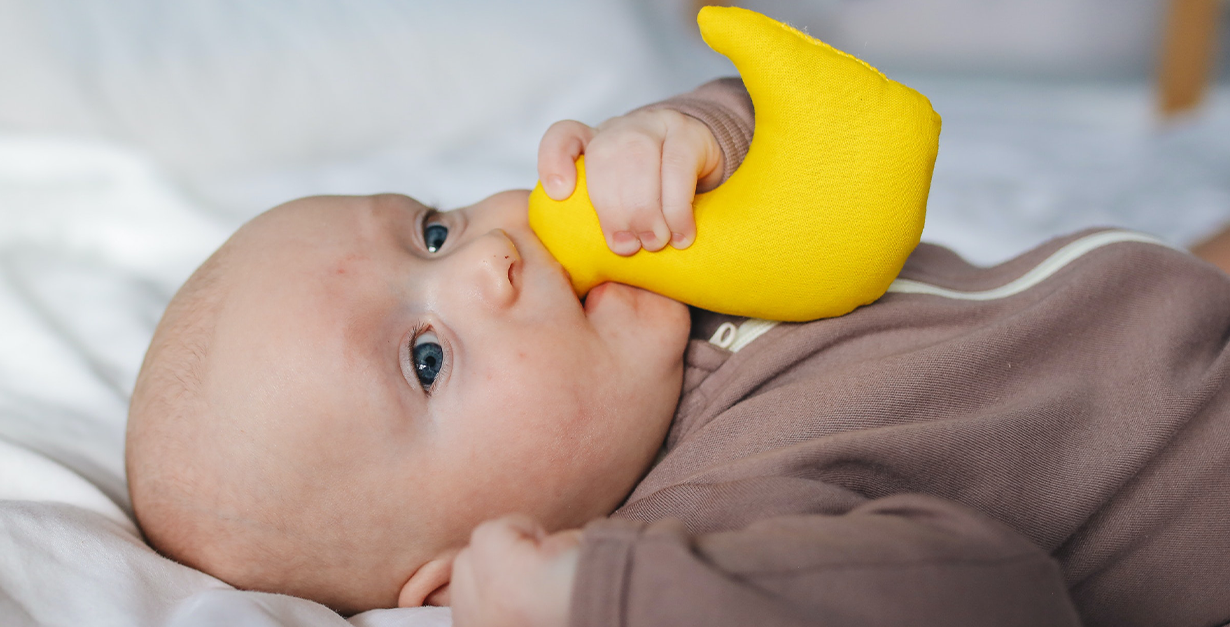Being a new parent can be the most demanding job in the world. If you had a stressful day at work and you haven’t had a single minute to yourself in months, the last thing you need is a cranky, teething baby. Teeth pain can be one of the most excruciating pains in the world, and sometimes we as adults have trouble dealing with it, let alone a tiny baby.
In our how to get a teething baby to sleep article, we will first discuss how to determine if your baby is crying from gum and teeth pain, and afterward, we will provide you options on what you can do to help your baby sleep tighter during the teething process.
Teething is an inevitable part of every baby’s development which means that every parent should be ready for when it happens and prepare for a couple of sleepless nights. It can be nerve-wracking for parents when their little ones experience discomfort while getting those first few teeth.
The crying baby can be more manageable during the daytime, but what can you do to soothe your little one at night and get him back to dreamland? Continue reading our article to find out!
How to Be Sure That Your Baby Is Teething
Before getting to the things you can do to soothe your teething baby, you have to make sure that the pain is teeth-related and not something else like fever, ear trouble, stomach issues, etc. Generally speaking, the teething with most babies begins somewhere between four and seven months of age. Although some babies can begin teething even earlier than four months, that is the average window.
If your baby is experiencing nighttime restlessness due to teething, you will notice some symptoms. Alongside difficulty sleeping, your baby will also feel irritation, fussiness, and excessive drooling, and it will most likely chew every toy near him.
Suppose your baby is experiencing a rash different from drool rash, diarrhea, high fever, or something else besides teething that may cause discomfort.
Tips on How to Get a Teething Baby to Sleep
Sleeping and teething go together like peanut butter and jelly. In our how to get a teething baby to sleep article, we will present you with a list of what to do and what to avoid to get your baby back to sleep and hopefully alleviate some of that gum pain.
The discomfort from teething is worse at night time since babies don’t have their typical daytime distractions. If your baby is teething, here are some tips that you can do and help your baby go back to sleep and get some rest.
Gum Massage
Several teething toys on the market are made from solid plastic or filled with gel, which can also be very helpful. You can store them in a freezer pre-hand, and the coldness can help even more. A friendly tip from us is to check the teething toy or teething ring before placing it in your baby’s mouth to ensure no broken pieces could pose a choking hazard.
Another thing you should avoid is jewelry such as necklaces and bracelets made from amber, silicone, or wood. You should prevent your baby from reaching them and placing them in the mouth. The Food and Drug Administration FDA warns parents against them because they pose a choking risk.
Cooling Treat
A cooling sensation can be a quick and beneficial option for sore gums. This trick doesn’t require any special equipment and is very easy. The only thing you need to do is put a few washcloths in the freezer during the daytime, so you don’t have to go through any hassle at 2 am.
First, soak a clean washcloth in water and place it in the freezer for about an hour. Ensure that the washcloth is regular and doesn’t have any rips or strings. The cold washcloth will cool your baby’s sore gums and instantly provide calmness so your little one can gnaw on it for a long time.
Become Your Baby’s Chew Toy
The most straightforward trick of all time that can work like a charm at 3 am is giving the baby your finger. Whether it is your baby’s first tooth or not, massaging your baby’s gums and letting it suck on your finger can be a quick and easy solution. Just make sure you wash your hands, and they are as clean as possible. In addition, you can dip your finger in cool water.
Wipe And Repeat
Most people and new parents don’t associate drool with being uncomfortable and assume that the baby should always be doing that. However, letting your baby drool and sit around with a wet face all day can be nerve-racking and cause a rash that will lead to discomfort at nighttime.
Even though you cannot catch every dribble from your baby’s mouth, make sure that you wipe and repeat your baby’s mouth as much as you can. Make sure that your little teether is as dry as possible during the day, which will result in a more comfortable night. If your baby is drooling and teething, it is a great time to invest in durable bibs that can be used for wiping at all times, and they don’t allow any drool to soak through your baby’s clothes.
Consider Medicine
It can be dangerous to disregard the old wives’ tales about rubbing whiskey or another alcoholic beverage on your baby’s gums. The Food and Drug Administration advises against numbing creams and gels for a teething baby. They may cause harmful side effects.
If you are out of options and all the recommended things are not working, it is always a good idea to consult with your pediatrician. If your baby is struggling to sleep and is constantly fussy, maybe some over-the-counter medicine is the only thing left to try. The pediatrician will confirm the proper dosage, and afterward, you are all set. A prescribed medicine that is often used for a teething baby is Tylenol. This medicine should be given to the baby half an hour before bedtime and can successfully block mouth pain.
The Takeaway
Hopefully, now you have the answer to getting a teething baby to sleep. In our article, you can find quick tips that don’t require a lot of effort in the middle of the night and are going to help your baby go back to sleep. Teething is one of the baby milestones every parent has a love-hate relationship with.








